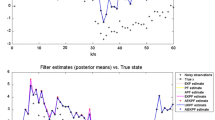Abstract
Particle filters (PF) and auxiliary particle filters (APF) are widely used sequential Monte Carlo (SMC) techniques. In this paper we comparatively analyse, from a non asymptotic point of view, the Sampling Importance Resampling (SIR) PF with optimal conditional importance distribution (CID) and the fully adapted APF (FA). We compute the (finite samples) conditional second order moments of Monte Carlo (MC) estimators of a moment of interest of the filtering pdf, and analyse under which circumstances the FA-based estimator outperforms (or not) the optimal Sequential Importance Sampling (SIS)-based one. Our analysis is local, in the sense that we compare the estimators produced by one time step of the different SMC algorithms, starting from a common set of weighted points. This analysis enables us to propose a hybrid SIS/FA algorithm which automatically switches at each time step from one loop to the other. We finally validate our results via computer simulations.











Similar content being viewed by others
Notes
The bounds α n and β n given in Corollary 1 come from simple sufficient conditions, and no conclusion holds if N eff(n)∈(α n ,β n ); so for simplicity we choose in the algorithm threshold \(\frac{\alpha_{n} + \beta_{n}}{2}\). Also in practice, the time varying and difficult to compute thresholds α n and β n can be replaced by a common fixed value which nevertheless takes into account the parameters of the model; this will be our choice in the simulations section.
References
Arulampalam, M.S., Maskell, S., Gordon, N., Clapp, T.: A tutorial on particle filters for online nonlinear/non-Gaussian Bayesian tracking. IEEE Trans. Signal Process. 50(2), 174–188 (2002)
Cappé, O., Moulines, É., Rydén, T.: Inference in Hidden Markov Models. Springer, Berlin (2005)
Cornebise, J., Moulines, É., Olsson, J.: Adaptive methods for sequential importance sampling with application to state-space models. Stat. Comput. 18(4), 461–480 (2008)
Crisan, D., Doucet, A.: A survey of convergence results on particle filtering methods for practitioners. IEEE Trans. Signal Process. 50(3), 736–746 (2002)
del Moral, P.: Feynman-Kac Formulae. Genealogical and Interacting Particle Systems with Applications. Probability and Its Applications. Springer, New York (2004)
Desbouvries, F., Petetin, Y., Monfrini, E.: Optimal SIR algorithm vs. fully adapted auxiliary particle filter: a matter of conditional independence. In: Proc. IEEE ICASSP, Prague, Czech Republic (2011)
Douc, R., Cappé, O., Moulines, É.: Comparison of resampling schemes for particle filtering. In: Proc. of the 4th ISPA, Zagreb, Croatia (2005)
Douc, R., Moulines, É., Olsson, J.: Optimality of the auxiliary particle filter. Probab. Math. Stat. 29(1), 1–28 (2009)
Doucet, A., Godsill, S.J., Andrieu, C.: On sequential Monte Carlo sampling methods for Bayesian filtering. Stat. Comput. 10, 197–208 (2000)
Doucet, A., de Freitas, N., Gordon, N. (eds.): Sequential Monte Carlo Methods in Practice, Statistics for Engineering and Information Science. Springer, New York (2001a)
Doucet, A., Gordon, N.J., Krishnamurthy, V.: Particle filters for state estimation of jump Markov linear systems. IEEE Trans. Signal Process. 49(3), 613–624 (2001b)
Fearnhead, P.: Computational methods for complex stochastic systems: a review of some alternatives to MCMC. Stat. Comput. 18(2), 151–171 (2008)
Gordon, N.J., Salmond, D.J., Smith, A.F.M.: Novel approach to nonlinear/non-Gaussian Bayesian state estimation. IEE Proc. F 140(2), 107–113 (1993)
Hol, J.D., Schön, T.B., Gustafsson, F.: On resampling algorithms for particle filtering. In: Proc. IEEE NSSPW, Cambridge, UK (2006)
Johansen, A.M., Doucet, A.: A note on the auxiliary particle filter. Stat. Probab. Lett. 78(12), 1498–1504 (2008)
Kitagawa, G.: Monte Carlo filter and smoother for non-Gaussian nonlinear state space models. J. Comput. Graph. Stat. 5(1), 1–25 (1996)
Kong, A., Liu, J.S., Wong, W.H.: Sequential imputations and bayesian missing data problems. J. Am. Stat. Assoc. 89(425), 278–288 (1994)
Künsch, H.R.: State space and hidden Markov models. In: Barndorff-Nielsen, O.E., Cox, D.R., Klüppelberg, C. (eds.) Complex Stochastic Systems. Monographs on Statistics and Applied Probability, vol. 87, pp. 109–173. Chapman and Hall/CRC, New York (2001)
Künsch, H.: Recursive Monte Carlo filters: algorithms and theoretical analysis. Ann. Stat. 33(5), 1983–2021 (2005)
Liu, J.S.: Metropolized independent sampling with comparisons to rejection sampling and importance sampling. Stat. Comput. 6, 113–119 (1996)
Liu, J.S., Chen, R.: Blind deconvolution via sequential imputation. J. Am. Stat. Assoc. 90(430), 567–576 (1995)
Liu, J.S., Chen, R.: Sequential Monte Carlo methods for dynamic systems. J. Am. Stat. Assoc. 93(443), 1032–1044 (1998)
Pitt, M.K., Shephard, N.: Filtering via simulation: auxiliary particle filter. J. Am. Stat. Assoc. 94(446), 550–599 (1999)
Ripley, B.D.: Stochastic Simulation. Wiley, New York (1987)
Saha, S., Manda, P.K., Boers, Y., Driessen, H., Bagchi, A.: Gaussian proposal density using moment matching in SMC methods. Stat. Comput. 19(2), 203–208 (2009)
van der Merwe, R., Doucet, A., de Freitas, N., Wan, E.: The unscented particle filter. In: Advances in Neural Information Processing Systems, vol. 13, pp. 584–590 (2001)
Whiteley, N., Johansen, A.M.: Recent developments in auxiliary particle filtering. In: Barber, D. Cemgil, A.T. Chiappa, S. (eds.) Inference and Learning in Dynamic Models. Cambridge University Press, Cambridge (2010)
Zaritskii, V., Svetnik, V., Shimelevich, L.: Monte Carlo technique in problems of optimal data processing. Autom. Remote Control, 12, 95–103 (1975)
Acknowledgements
The authors would like to thank the French MOD DGA/MRIS for financial support of the Ph.D. of Y. Petetin, and Dr. E. Monfrini for fruitful discussions and comments.
Author information
Authors and Affiliations
Corresponding author
Rights and permissions
About this article
Cite this article
Petetin, Y., Desbouvries, F. Optimal SIR algorithm vs. fully adapted auxiliary particle filter: a non asymptotic analysis. Stat Comput 23, 759–775 (2013). https://doi.org/10.1007/s11222-012-9345-5
Received:
Accepted:
Published:
Issue Date:
DOI: https://doi.org/10.1007/s11222-012-9345-5




